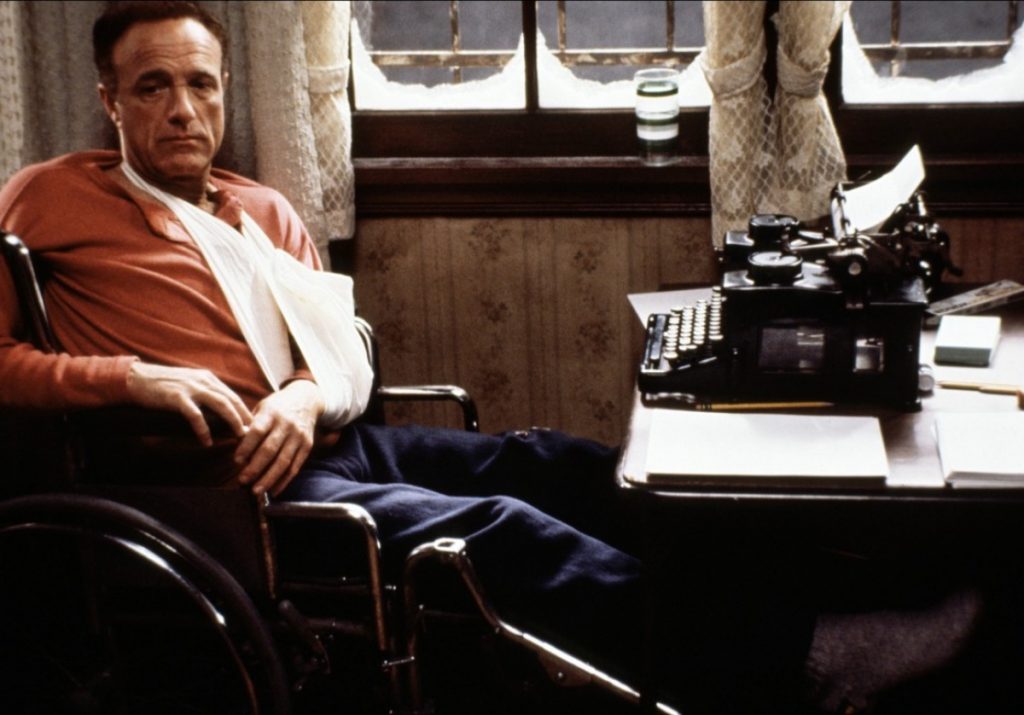
Writing can be lonely work. Photo courtesy: Castle Rock Entertainment
I remember when I started taking workshops I’d occasionally meet a writer who was terrified that other writers would steal their ideas. If you listened closely, you could tell that they actually viewed other writers as enemies. This is such a bad attitude to have, for many reasons. Obviously, I can’t tell you that no writer has ever stolen an idea; I can tell you that other writers are the least likely people in Hollywood to steal your ideas and the most likely to be outraged if that happens. More importantly, other writers can help you at almost every stage of your career. The benefits of having strong ties to other writers far out way the risks.
LEARNING
Other writers will help you learn your craft. If you take a writing workshop the instructor will almost always be another writer. They may not have written one of last year’s blockbuster—those people are typically too busy to teach you how to write—but they will have valuable experience to share with you.
As will the other students. Most writing classes are designed as workshops in which you read and critique each other’s works. One of the things I remember clearly about writing a script in a workshop is that very often I would criticize someone’s scene or structure and then find myself trying to do whatever I’d criticized a week or so later. That would make me stop and begin again. As a general rule: If it’s wrong when you see it in someone else’s script, it’s wrong when you try to put it in yours.
Another thing about workshops is that at least a few of the other writers are much better than you are. Some people get depressed by this. You should not. In fact, if you’re the best person in your writing program then you need to think about a different program. You need to be around better writers so that you can learn from them. You need to figure out why you think they’re so good and try to do the same thing—or better yet, your version of the same thing.
STRATEGY
Once you feel you’re ready to look for work other writers can help you with strategies for getting attention. There are lots of different ways to “make” it in the industry and writers are always coming up with new ones. Sometimes the same thing will work for you, or sometimes just thinking outside of the box with another writer will help you figure out your next step. They can share information with you about agents, lawyers, managers, contests, internships, writing assistant jobs, and many, many other things.
CONTACTS
If you’re talking television writing then knowing other writers can be tremendously helpful since in TV writers are also producers. Much like any other business who you know will matter. I used to be very frustrated by the idea of getting ahead via “Who you know” because I didn’t know anyone. But then I realized, you could change who you know. You’ll be meeting people all your life, in school, at the job, on social occasions. Meeting people is making contacts.
In film, writers are pretty much the bottom of the pile. If you’re writing film it’s still important to know other writers, just don’t expect them to get you a job. It’s very, very unusual when a film writer is in the position to hire another writer.
Now, I do have one rule about making contacts or, as it’s often called, networking: Never network someone you don’t like. They might actually give you a job and then you’re stuck with them. Networking should always be about meeting people you like, people you have a natural affinity for, and people whose work you respect.
This is probably not your writer’s group. Photo from 30 Rock courtesy NBC Studios.
COMMUNITY
Someday, if you’re lucky, you’ll be in the Writer’s Guild of America. You will then be a card-carrying member of a community of writers. In the meantime, there are ways to be involved with the WGA—certainly, there are many events open to non-members—you can find out at WGA.ORG. The Guild can also answer questions for you if you’re offered a job, whether it’s union or non-union. For example, if a producer offers you work you can check to see if they’re signatory which would mean they can’t offer you less than minimum even if you’re not in the union yet.
There are many other kinds of writing communities, from online forums to in-person critique groups. Not all types of communities work for every writer. Figure out where you best fit you and then jump in.
There’s someone out there who gets you. Photo courtesy: Columbia Pictures
THEY JUST GET YOU
Being a writer can be a hard life. Not everyone you care about is going to understand what you’re doing or why. Low paying survival jobs, long hours alone, self-imposed deadlines, random epiphanies, constant distraction. Writers don’t always make a lot of sense to non-writers. That doesn’t mean all your relationships should be with other writers, it does mean that some of your relationships should be with other writers since they will understand you in a way others don’t. Your family and your significant other will understand you in important ways but they may never understand the writer part. Always have a few friends who do.
Of course, each of these areas overlaps. You can often get good strategy advice from a critique group and any community you join will likely be offering craft and career development support. The important thing here is that you remember to allow other writers to enhance your life.